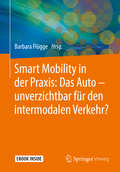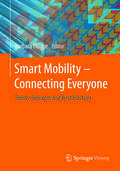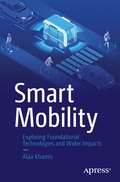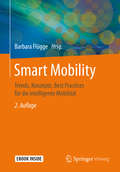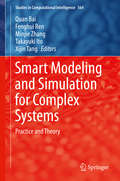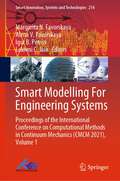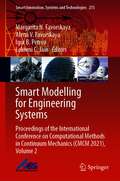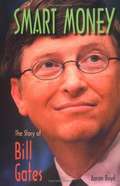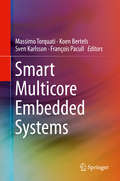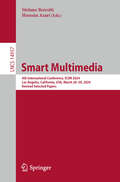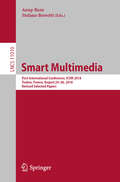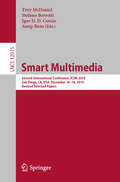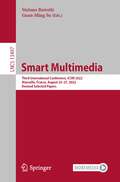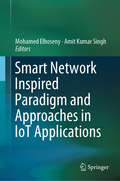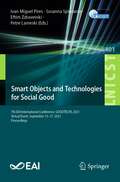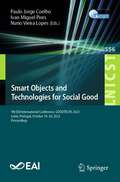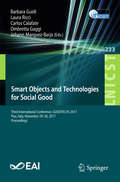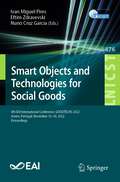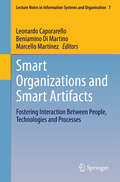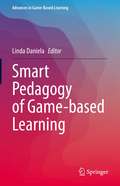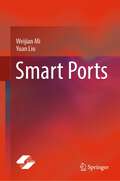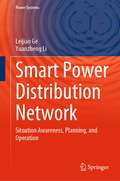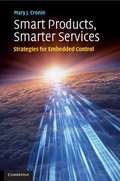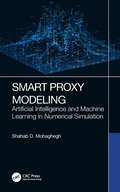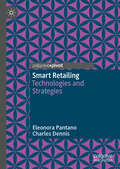- Table View
- List View
Smart Mobility in der Praxis: Das Auto – unverzichtbar für den intermodalen Verkehr?
by Barbara FlüggeDie Zukunft der Städte und Ballungsräume hängt zunehmend davon ab, wie Verkehrsteilnehmer ihre unterschiedlichen Bedürfnisse koordinieren. Das Konzept der Smart Mobility bietet die Möglichkeit, die geeigneten Transportmittel für Individual- und Frachtverkehr vorausschauend, digital und intermodal abzurufen. Davon profitieren die Verkehrsteilnehmer, aber auch unser Ökosystem. Dieses Fachbuch wirft einen Blick hinter das Konzept einer durch Digitalisierung gestützten intelligenten Mobilität. Es illustriert Vorgehensweisen und Fragestellungen anhand von fiktiven wie realitätsnahen Projektierungsbeispielen in Städten und Regionen und behandelt zentrale Fragen: Wie lassen sich Mobilitätsszenarien ganzheitlich einschätzen und erfassen? Welches sind die wesentlichen Schritte, die es dabei zu berücksichtigen gilt?Das Einführungskapitel stellt das Konzept „Smart Mobility“ vor und erläutert verschiedene Projektierungsansätze sowie die Bausteine Intelligenter Mobilität (BIM). Zehn Fallbeispielen, unter anderem zum Autonomen Fahren, zu intelligenten Verkehrsknotenpunkten, zum Erlebnisraum Auto und der E-Mobilität, zeigen praxisnah, wie die Tools, Vorgehensweisen und BIM anzuwenden sind. Zahlreiche Checklisten und Abbildungen unterstreichen darüber hinaus den Praxisbezug dieses Werkes. Das Begleitbuch zu „Smart Mobility“ von Barbara Flügge, Digitalisierungsexpertin und Beraterin, richtet sich an Entscheider und Unternehmer sowie an Projektleiter und -mitarbeiter im Rahmen von Smart-City-Vorhaben. Außerdem eignet sich dieser Band ideal zur Vor- und Nachbereitung von Lehrveranstaltungen zu Themen wie Smart Cities oder Urban Systems Research.
Smart Mobility – Connecting Everyone
by Barbara FlüggeThis book presents a comprehensive overview of various aspects of mobility and transportation to be smart and seamless. It provides basic principles and trends of smart mobility as well as international examples. The topic of this work is especially interesting as the future of human centered and business triggered ecosystems is increasingly dependent on the coordination capabilities of all participating and influencing members to manage transportation needs. Even more the fulfillment of the right to mobility for individual and cargo related mobility asks for mobility enablement in a predictive, digital and intermodal manner. Therefore, this book is useful not only for decision makers in several positions but also for people who are interested in trends of transportation and mobility.
Smart Mobility: Exploring Foundational Technologies and Wider Impacts
by Alaa KhamisEach year we witness several paradigm shifts in mobility systems and services, increasingly so as technology progresses. The future of mobility is people-centric, software-defined, connected, and electric. Now more than ever, it is imperative for current and aspiring leaders in the field to understand the foundations of people-centric smart cities with a focus on sustainability. Smart Mobility offers a holistic view of the current and emerging smart mobility systems and explores their foundational technologies, technology enablers, and disruptors. Author Alaa Khamis acknowledges the need for smart mobility arising with growing world urbanization, and the impact of this on public health, congestion, and climate change. Khamis expertly interrogates how a focus on smart mobility can mitigate all of these risks using his triad of complementary factors: technology, governance, and city planning. In this book you’ll study how foundational technologies such as artificial intelligence, blockchain, the Internet of Things, robotics, and many more all work together to allow for smart mobility in our modern era. Khamis additionally covers the topical events of the COVID-19 pandemic and analyzes its impact on consumer behavior and the expected short-term disruptions and longer-term structural changes. The socioeconomic changes in our urban centers are vast, and Smart Mobility breaks down the core concepts with meaningful data and insights.What You Will LearnExplore different mobility modes, including mobility-as-a-service, shared mobility, mobility on demand, the gig economy and the passenger economyCover how the smart mobility triad - technology, governance, and city planning - work together to create a smart and sustainable mobilitySee how the COVID-19 pandemic is impacting consumer behavior and preferences and changing the future of mobilityWho This Book Is ForWorking professionals, students, researchers, technologists, city planners, and the curious layman.
Smart Mobility: Trends, Konzepte, Best Practices für die intelligente Mobilität
by Barbara FlüggeMit diesem Buch gelingt der Einstieg in das Trendthema „Smart Mobility“Dieses Buch bietet Ihnen einen umfassenden Zugang zum aktuellen Trendthema Smart Mobility. Die thematisch vielfältigen Beiträge maßgeblicher Expertinnen und Experten – zusammengetragen von Herausgeberin Barbara Flügge – beleuchten u. a. folgende Schwerpunkte:• Sozio-ökologische und sozio-ökonomische Aspekte der Mobilität• Die Anforderungen von Anbietern und Nachfragern• Mobilitätsansprüche ganzer Ökosysteme (Stadt, Land und Ballungsräume)• Anwendbarkeit digitaler Lösungen für die Lebensbereiche jedes EinzelnenMit diesem Setup setzt das Buch wirkungsvoll die Ausgangssituation in der Smart Mobility in den Kontext von unterschiedlichsten Nutzungsszenarien und Initiativen. Die Beiträge erläutern einzelne Bausteine Intelligenter Mobilität (BIM) und Vorgehensmodelle. Zudem liefert Ihnen dieses Herausgeberwerk zahlreiche praxisorientierte Handlungsempfehlungen und Best Practices, die Ihnen die Analyse-, Planungs- und Umsetzungsphasen von Mobilitätsvorhaben erleichtern. Damit richtet sich dieses Buch über Smart Mobility in erster Linie an:a) Chief Digital Officersb) Entscheider in öffentlichen Verwaltungen und in der Privatwirtschaftc) Innovationstreiber und Entrepreneure aus der Praxis d) Projektleiter und -mitarbeiter – sei es im Personen- oder FrachtverkehrDie Gegenwart und Zukunft im BlickUm Ihnen den Einstieg zu erleichtern, geben Ihnen die Beiträge zunächst einen Überblick über das große Themenfeld der Smart Mobility. Hier erfahren Sie, welche Vorgehensweisen sich zur Bewertung von Mobilität eignen, wodurch sich das Kauf- und Nutzverhalten im Personenverkehr heutzutage auszeichnet und wie Sie ein sicheres sowie nachhaltiges Verkehrsmanagement gestalten können. Weitere inhaltliche Schwerpunkte dieses Buchs sind:• Indoor- und Outdoor-Navigation in Smart Mobility-Szenarien• Inter- und multimodale Routenplanung• Smart Ticketing• Mobilitätsrelevante Diagnostik• Bausteine Intelligenter Mobilität für die Zukunft• Das Smart Mobility VorgehensmodellEin umfassendes GrundlagenwerkMit der zweiten aktualisierten Auflage bringt Ihnen dieses Buch den Themenkomplex der Smart Mobility anschaulich und nachvollziehbar näher. Die inhaltliche Mischung aus theoretischem Basiswissen sowie aktuellen Trends (wie z. B. Mega Cities oder Zero Traffic) und hilfreichen Checklisten machen dieses Werk zu einem nachvollziehbaren und anschaulichen Grundlagenwerk für alle Themeninteressierten.
Smart Modeling and Simulation for Complex Systems
by Quan Bai Fenghui Ren Minjie Zhang Takayuki Ito Xijin TangThis book aims to provide a description of these new Artificial Intelligence technologies and approaches to the modeling and simulation of complex systems, as well as an overview of the latest scientific efforts in this field such as the platforms and/or the software tools for smart modeling and simulating complex systems. These tasks are difficult to accomplish using traditional computational approaches due to the complex relationships of components and distributed features of resources, as well as the dynamic work environments. In order to effectively model the complex systems, intelligent technologies such as multi-agent systems and smart grids are employed to model and simulate the complex systems in the areas of ecosystem, social and economic organization, web-based grid service, transportation systems, power systems and evacuation systems.
Smart Modelling For Engineering Systems: Proceedings of the International Conference on Computational Methods in Continuum Mechanics (CMCM 2021), Volume 1 (Smart Innovation, Systems and Technologies #214)
by Lakhmi C. Jain Margarita N. Favorskaya Alena V. Favorskaya Igor B. PetrovThis book is a collection of research papers selected for presentation at the International Conference on Smart Computational Methods in Continuum Mechanics 2021, organized by Moscow Institute of Physics and Technology and the Institute for Computer Aided Design of Russian Academy of Sciences. The work is presented in two volumes. The primary objective of the book is to report the state-of-the-art on smart computational paradigms in continuum mechanics and explore the use of artificial intelligence paradigms such as neural nets, and machine learning for improving the performance of the designed engineering systems. The book includes up-to-date smart computational methods which are used to solve problems in continuum mechanics, engineering, seismic prospecting, non-destructive testing, and so on. The main features of the book are the research papers on the application of novel smart methods including neural nets and machine learning, computational algorithms, smart software systems, and high-performance computer systems for solving complex engineering problems. The case studies pertaining to the real-world applications in the above fields are included. The book presents a collection of best research papers in English language from some of the world leaders in the field of smart system modelling and design of engineering systems.
Smart Modelling for Engineering Systems: Proceedings of the International Conference on Computational Methods in Continuum Mechanics (CMCM 2021), Volume 2 (Smart Innovation, Systems and Technologies #215)
by Lakhmi C. Jain Margarita N. Favorskaya Alena V. Favorskaya Igor B. PetrovThis book is a collection of research papers selected for presentation at the International Conference on Smart Computational Methods in Continuum Mechanics 2021, organized by Moscow Institute of Physics and Technology and the Institute for Computer Aided Design of Russian Academy of Sciences. The work is presented in two volumes. The primary objective of the book is to report the state-of-the-art on smart computational paradigms in continuum mechanics and explore the use of artificial intelligence paradigms such as neural nets and machine learning for improving the performance of the designed engineering systems. The book includes up-to-date smart computational methods which are used to solve problems in continuum mechanics, engineering, seismic prospecting, non-destructive testing, and so on. The main features of the book are the research papers on the application of novel smart methods including neural nets and machine learning, computational algorithms, smart software systems, and high-performance computer systems for solving complex engineering problems. The case studies pertaining to the real-world applications in the above fields are included. The book presents a collection of best research papers in English language from some of the world leaders in the field of smart system modelling and design of engineering systems.
Smart Money: The Story of Bill Gates
by Aaron BoydBill Gates and Microsoft, the company he founded in 1975, have become a driving force in the technological revolution and the world economy. Already the wealthiest man in the world, Gates is determined to control the direction of software and technological change well into the 21st century.
Smart Multicore Embedded Systems
by Massimo Torquati Koen Bertels Sven Karlsson François PacullThis book provides a single-source reference to the state-of-the-art of high-level programming models and compilation tool-chains for embedded system platforms. The authors address challenges faced by programmers developing software to implement parallel applications in embedded systems, where very often they are forced to rewrite sequential programs into parallel software, taking into account all the low level features and peculiarities of the underlying platforms. Readers will benefit from these authors' approach, which takes into account both the application requirements and the platform specificities of various embedded systems from different industries. Parallel programming tool-chains are described that take as input parameters both the application and the platform model, then determine relevant transformations and mapping decisions on the concrete platform, minimizing user intervention and hiding the difficulties related to the correct and efficient use of memory hierarchy and low level code generation.
Smart Multimedia: 4th International Conference, ICSM 2024, Los Angeles, California, USA, March 28–30, 2024, Revised Selected Papers (Lecture Notes in Computer Science #14957)
by Stefano Berretti Hossein AzariThis book constitutes the refereed post-proceedings of the 4th International Conference on Smart Multimedia, ICSM 2024, held in Los Angeles, California, USA, in March 28–30, 2024. The 9 full papers, 8 special papers, 4 industrial papers, 3 late breaking papers, and 3 short papers presented were carefully reviewed and selected from 60 submissions. The papers are organized in the following topical sections: machine learning for multimedia; multimedia; special session on smart homes and cities - the future through smart technological innovations; multimedia processing; short and industrial papers; industrial trend; late breaking papers; special session: haptic and human machine interaction.
Smart Multimedia: First International Conference, ICSM 2018, Toulon, France, August 24–26, 2018, Revised Selected Papers (Lecture Notes in Computer Science #11010)
by Stefano Berretti Anup BasuThis book constitutes the proceedings of the First International Conference on Smart Multimedia, ICSM 2018, which was held in Toulon, France, in August 2018. The 39 papers presented were selected from about 100 submissions and are grouped in sections on social, affective and cognition analysis, person-centered smart multimedia: serving people with disabilities to the general population, haptic and robots for smart multimedia applications, MR, 3D, underwater image processing, smart signal processing meets smart sensing, visual behavior analysis: methods and applications, video analysis, learning, low-level vision, miscellaneous.
Smart Multimedia: Second International Conference, ICSM 2019, San Diego, CA, USA, December 16–18, 2019, Revised Selected Papers (Lecture Notes in Computer Science #12015)
by Stefano Berretti Anup Basu Troy McDaniel Igor D. D. CurcioThis book constitutes the proceedings of the Second International Conference on Smart Multimedia, ICSM 2019, which was held in San Diego, CA, USA, in December 2019. The 45 papers presented were selected from about 100 submissions and are grouped in sections on 3D mesh and depth image processing; image understanding; miscellaneous; smart multimedia for citizen-centered smart living; 3D perception and applications; video applications; multimedia in medicine; haptics and applications; smart multimedia beyond the visible spectrum; machine learning for multimedia; image segmentation and processing; biometrics; 3D and image processing; and smart social and connected household products.
Smart Multimedia: Third International Conference, ICSM 2022, Marseille, France, August 25–27, 2022, Revised Selected Papers (Lecture Notes in Computer Science #13497)
by Guan-Ming Su Stefano BerrettiThis book constitutes the proceedings of the Third International Conference on Smart Multimedia, ICSM 2022, which was held in Marseille, France, during August 25–27, 2022.The 30 full papers and 4 short paper presented in this volume were carefully reviewed and selected from 68 submissions. The contributions were organized in topical sections as follows: Machine Learning for Multimedia; Image Processing; Multimedia Applications; Multimedia for Medicine and Health-Care; Smart Homes; Multimedia Environments and Metaverse; Deep Learning on Video and Music; Haptic; Industrial.
Smart Network Inspired Paradigm and Approaches in IoT Applications
by Amit Kumar Singh Mohamed ElhosenyThis book gathers high-quality research articles and reviews that reflect the latest advances in the smart network-inspired paradigm and address current issues in IoT applications as well as other emerging areas. Featuring work from both academic and industry researchers, the book provides a concise overview of the current state of the art and highlights some of the most promising and exciting new ideas and techniques. Accordingly, it offers a valuable resource for senior undergraduate and graduate students, researchers, policymakers, and IT professionals and providers working in areas that call for state-of-the-art networks and IoT applications.
Smart Objects and Technologies for Social Good: 7th EAI International Conference, GOODTECHS 2021, Virtual Event, September 15–17, 2021, Proceedings (Lecture Notes of the Institute for Computer Sciences, Social Informatics and Telecommunications Engineering #401)
by Ivan Miguel Pires Susanna Spinsante Eftim Zdravevski Petre LameskiThis book constitutes the refereed post-conference proceedings of the 7th EAI International Conference on Smart Objects and Technologies for social Good, GOODTECHS 2021, held in September 2021. Due to COVID-19 pandemic the conference was held virtually. The 24 full papers presented were selected from 53 submissions and issue design, implementation, deployment, operation, and evaluation of smart objects and technologies for social good. Social goods are products and services provided through private enterprises, government, or non-profit institutions and are related to healthcare, safety, sports, environment, democracy, computer science, and human rights. The papers are arranged in tracks on machine learning; IoT; social considerations of technology; technology and ageing; healthcare.
Smart Objects and Technologies for Social Good: 9th EAI International Conference, GOODTECHS 2023, Leiria, Portugal, October 18-20, 2023, Proceedings (Lecture Notes of the Institute for Computer Sciences, Social Informatics and Telecommunications Engineering #556)
by Ivan Miguel Pires Paulo Jorge Coelho Nuno Vieira LopesThis book constitutes the refereed post-conference proceedings of the 9th EAI International Conference on Smart Objects and Technologies for Social Goods, GOODTECHS 2023, held in Leiria, Portugal, during October 18-20, 2023.The 13 full papers included in this book were carefully reviewed and selected from 30 submissions. They were organized in topical sections as follows: designing, implementing, deploying, operating, and evaluating smart objects and technologies for social benefit.
Smart Objects and Technologies for Social Good: Third Eai International Conference, Goodtechs 2017, Pisa, Italy, November 29-30, 2017, Proceedings (Lecture Notes of the Institute for Computer Sciences, Social Informatics and Telecommunications Engineering #233)
by Laura Ricci Johann Marquez-Barja Ombretta Gaggi Barbara Guidi Carlos CalafateThis book constitutes the refereed proceedings of the Third EAI International Conference on Smart Objects and Technologies for Social Good, GOODTECHS 2017, held in Pisa, Italy, November 29-30, 2017. The 38 revised full papers presented were carefully reviewed and selected from 70 submissions. The papers reflect the design, implementation, deployment, operation and evaluation of smart objects and technologies for social good. A social good can be understood as a service that benefits a large number of people in a most possible way. Some classic examples are healthcare, safety, environment, democracy, and human rights, or even art, entertainment, and communication.
Smart Objects and Technologies for Social Goods: 8th EAI International Conference, GOODTECHS 2022, Aveiro, Portugal, November 16-18, 2022, Proceedings (Lecture Notes of the Institute for Computer Sciences, Social Informatics and Telecommunications Engineering #476)
by Ivan Miguel Pires Eftim Zdravevski Nuno Cruz GarciaThis book constitutes the refereed post-conference proceedings of the 8th EAI International Conference on Smart Objects and Technologies for social Goods, GOODTECHS 2022, held in Aveiro, Portugal, in November 16-18, 2022 The 7 full papers presented were selected from 18 submissions and issue design, implementation, deployment, operation, and evaluation of smart objects and technologies for social good. Social goods are products and services provided through private enterprises, government, or non-profit institutions and are related to healthcare, safety, sports, environment, democracy, computer science, and human rights.
Smart Organizations and Smart Artifacts
by Beniamino Di Martino Leonardo Caporarello Marcello MartinezThis book offers a multidisciplinary strategy for finding new and more effective human-computer interaction approaches, in particular from a socio-technical perspective, that facilitate the exploration and exploitation of benefits that information technologies (IT) offer organizations. Though the relationship between IT and organizations is certainly very strong, it is also one of the greatest obstacles to securing benefits from their interaction. The participation of organizational users in the planning and design stages of IT interfaces is the main area of human-computer interaction, where a wealth of contributions are positively enriching both the academic and management discussions. Thus, a new approach for managing this relationship is needed, one in which the different stakeholders are suitably taken into account. Moreover, the outstanding success of the 2. 0 phenomenon offers an example of a relevant platform where human-computer interaction has been widely developed and exploited. Consequently, this will influence and already is influencing - the way IT and users interact with each other. The book is based on a selection of the best papers - original, double blind peer-reviewed contributions - from the annual conference of the Italian chapter of the AIS, held in Milan, Italy in December 2013.
Smart Pedagogy of Game-based Learning (Advances in Game-Based Learning)
by Linda DanielaThis book addresses the role of appropriate, specialized, structured pedagogy for game-based learning. It is an important reference for researchers who have carried out studies in the field of game-based learning with a focus on the digital learning environment. The educational landscape has dramatically changed in times of global pandemic urging us to search for new solutions, new educational pathways, and new agents for knowledge development. There is a need to support learning by using digital learning materials during remote learning or distance learning, where pedagogically structured game-based learning elements can play a role in motivating students to achieve.Utilizing game-based learning in education is not new, but this book adds substantially to the research base of the topic. The book reveals many new concepts, such as, balancing games and learning, supporting knowledge development, supporting the development of motivation, supporting balanced cognitive load in an effort to avoid ineffective forms of game-based learning
Smart Ports
by Yuan Liu Weijian MiThis book demonstrates the concept of ecological system of the smart ports. The innovation is emphasized as the essence of the ecological system as well as the prerequisite and foundation of sustainable development of smart ports. The main supporting technologies of smart ports, including cyber-physical system, middle-office system, blockchain, artificial intelligence, machine vision, AR/VR, system simulation and emulation, digital monitoring and diagnosis, etc., are introduced with concepts and development descriptions as well as practical application cases. It could be used as demonstration and reference for the administrative staff, engineers and technicians as well as researchers in construction and operation of smart ports.
Smart Power Distribution Network: Situation Awareness, Planning, and Operation (Power Systems)
by Yuanzheng Li Leijiao GeThe surge in renewable and distributed energy sources has posed significant challenges for smart power distribution network (SPDN). These challenges fall into two main categories: the unpredictability of renewable energy sources and the complexities introduced by numerous electrical devices and their interdependencies, affecting forecasting and operational performance. As the emphasis on SPDN's economic and environmental aspects grows, this book focuses on the vital themes of sustainability and cost-efficiency in SPDN forecasting, planning, and operation. It is structured into three key parts:1. SPDN Situation Awareness: This section assesses prior research methods, analyzes their shortcomings while dissecting SPDN's unique situation awareness characteristics. Then, some forecast and virtual collection methods are presented. 2. Boosting SPDN Planning: Addressing optimal planning challenges in SPDN, this part introduces advanced modelling and algorithm solving techniques, tailored to mitigate SPDN's inherent uncertainty.3. Enhancing SPDN Operation: Considering a variety of equipment types and controllable loads, this section explores strategies to boost SPDN operational performance. It covers control methodologies for electric vehicles, flexible loads, energy storage, and related equipments, etc.Tailored for university researchers, engineers, and graduate students in electrical engineering and computer science, this book is a valuable resource for comprehending SPDN's situation awareness, planning, and operation intricacies in the context of sustainability and economic efficiency.
Smart Products, Smarter Services: Strategies for Embedded Control
by Mary J. CroninWe are surrounded by products that have minds of their own. Computing power, in the form of microcontrollers, microprocessors, sensors, and data storage chips, has become so cheap that manufacturers are building connectivity and embedded intelligence into all types of consumer goods. These 'smart products' are fundamentally changing both the competitive landscape for business and the daily lives of consumers. This book analyzes the evolution of smart products to help managers understand the impact of embedded product intelligence on corporate strategy, consumer value, and industry competition. It describes four different ecosystem strategies for designing and launching smart products: the control-focused Hegemon, the standards-focused Federator, the high growth and brand-focused Charismatic Leader, and the disruptive industry Transformer. This ecosystem model is then applied to smart products in the automotive, wireless, energy, residential, and health industries. The book concludes with recommendations for successfully managing smart products and services.
Smart Proxy Modeling: Artificial Intelligence and Machine Learning in Numerical Simulation
by Shahab D. MohagheghNumerical simulation models are used in all engineering disciplines for modeling physical phenomena to learn how the phenomena work, and to identify problems and optimize behavior. Smart Proxy Models provide an opportunity to replicate numerical simulations with very high accuracy and can be run on a laptop within a few minutes, thereby simplifying the use of complex numerical simulations, which can otherwise take tens of hours. This book focuses on Smart Proxy Modeling and provides readers with all the essential details on how to develop Smart Proxy Models using Artificial Intelligence and Machine Learning, as well as how it may be used in real-world cases. Covers replication of highly accurate numerical simulations using Artificial Intelligence and Machine Learning Details application in reservoir simulation and modeling and computational fluid dynamics Includes real case studies based on commercially available simulators Smart Proxy Modeling is ideal for petroleum, chemical, environmental, and mechanical engineers, as well as statisticians and others working with applications of data-driven analytics.
Smart Retailing: Technologies and Strategies
by Eleonora Pantano Charles DennisBy providing a comprehensive theoretical framework, this book aims to map the most relevant technologies that have the potential to reshape the retail industry. The authors demonstrate how technology is pushing innovation, and examine how smart technologies can be fruitfully applied both in-store and through digital channels. The aim of the book is to synthesise theory and practice, and provide a richer understanding of new digital opportunities offered by the ‘smart’ experience. An accessible resource for researchers who want to understand this phenomenon as part of their expertise in digital marketing and e-commerce, Smart Retailing also provides insights for practitioners who are experiencing the dramatic effects of new technologies on their retail strategies.
